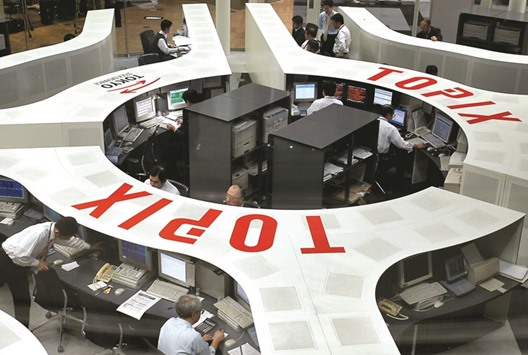Japan and Europe, former darlings of stock investors, are now bottom of the heap.
The Topix index lost 13% from the start of the year through last week and foreign investors have yanked $10.7bn out of Japanese equities. The world’s worst-performing developed markets are found in Tokyo and across Europe, where a regional benchmark gauge lost 6.8% and strategists expect shares to tread water for the rest of 2016. For Tatsushi Maeno, head of Japanese equities at Pinebridge Investments Japan Co, it’s no coincidence that those are the two regions where central banks have established negative interest rates.
“The feeling is that we can’t ride our hopes on the monetary easing policies of the European Central Bank and the Bank of Japan anymore,” Maeno said. “They want to continue with negative interest rates, but there’s push back. They want additional easing, but we’re beginning to see the limits to that too.”
As company profits decline and the yen and euro strengthen, investors are questioning the effectiveness of the stimulus that’s underpinned Japanese and European equities since 2012. In contrast, the easing is working elsewhere around the world, including emerging markets where equities are staging a 20% rally and as shares in the US have erased losses for the year.
The moves so far this year are a stark reversal of 2015’s investment trends, which saw shares in Japan and Europe rise 9.9% and 6.8%, respectively, while global equities fell 4.3% and emerging markets tumbled 17%.
Bank of America Corp’s monthly survey of fund managers consistently showed Europe and Japan as one of the most preferred markets throughout last year.
The latest example of diverging reactions to stimulus was on display this month, when the ECB’s decision to cut all three key rates and boost bond buying did little to spur a strong rebound.
In Japan, Bank of Japan Governor Haruhiko Kuroda’s suggestion that he could cut interest rates to as low as 0.5% sent the nation’s banks and insurers tumbling, which weighed on the overall market. “Equities cannot really rally on monetary stimulus anymore,” Stephen Jen, co-founder of SLJ Macro Partners in London and a former International Monetary Fund economist, wrote in an e-mail. “As long as the earnings outlook continue to deteriorate, the basis for additional multiples expansion is not compelling.”
The situation has been exacerbated by foreign currencies. Both the euro and yen have rallied despite the easing bias at the ECB and the BoJ. That’s been particularly painful in Japan, where the surging yen has weighed on the country’s exporters.
The Topix jumped 1.9% on Tuesday, its first gain in five days, as the yen weakened. Bank of America’s latest survey of fund managers showed preference for Japanese equities fall to a 22-month low.
Further central bank easing is likely to benefit overlooked markets more than those already saturated by stimulus, according to Khiem Do, the Hong Kong-based head of multi-asset strategy at Baring Asset Management, which oversees about $41bn.
“The distressed asset classes like emerging markets and commodities are rejoicing,” said Do. “But that has to be funded by something, which is unfortunately Europe and Japan.”
Do also notes there may be bigger, cultural implications, a position that is echoed by SLJ’s Jen.
“Some nations are prone to borrow money,” he said. “If you have negative interest rates in America, they will go out in the streets and party every day. But it is not in Europe and not in Japan because they’re net savers. They’re confused, they’re not spending, suddenly the economy weakens and it could weaken more and businesses don’t know what to do.”

Traders work at the Tokyo Stock Exchange. The Topix index lost 13% from the start of the year through last week and foreign investors have yanked $10.7bn out of Japanese equities.
